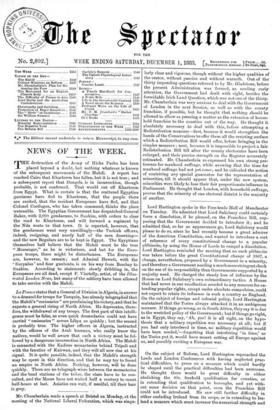Lord Hartington spoke in the Free-trade Hall of Manchester on
Tuesday. He admitted that Lord Salisbury could certainly force a dissolution, if he pleased, on the Franchise Bill, sup- posing that the Government decided to introduce it; and he admitted that, so far as appearances go, Lord Salisbury would please to do so, since he had recently become a great admirer of the American Constitution, and wanted to introduce a sort of reference of every constitutional change to a popular plebiscite, by using the House of Lords to compel a dissolution. Lord Hartington reminded the meeting that no such plebiscite was taken before the great Constitutional change of 1867, a change, nevertheless, proposed by a Government in a minority, and therefore a Government needing a much morestringent check on the use of its responsibility than Governments supported by a majority need. He charged the steady loss of influence by the House on Lord Salisbury's own extraordinary tactics. A House that had never in our recollection acceded to any measure for ex- tending popular rights, except under absolute compulsion, could not expect to retain its influence in such a country as England. On the subject of foreign and colonial policy, Lord Hartington maintained that the Tories always attacked it in an ambiguous manner. If things go wrong, as in South Africa, they say it is due to the wretched policy of the Government; but if things go right, as in Egypt, they say, 'Ab, yes! it is all right, on the hypo- thesis that a military expedition was necessary at all; but if you had only interfered in time, no military expedition would have been needed,'—forgetting that interfering 'in time,' as the Tories put it, would have meant setting all Europe against us, and possibly exciting a European war.






































